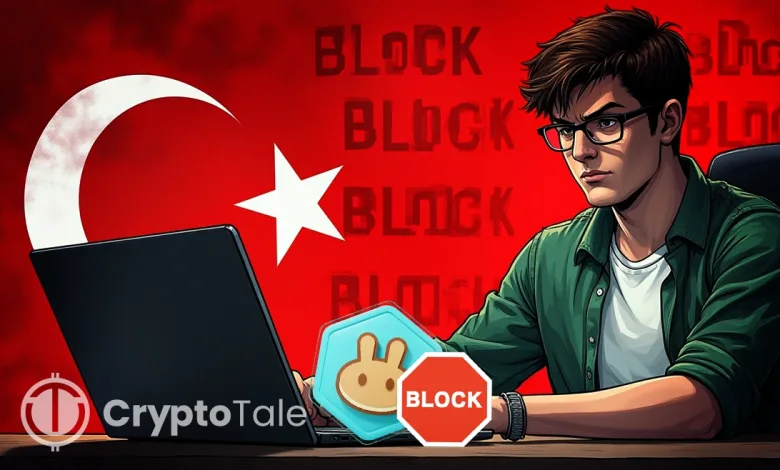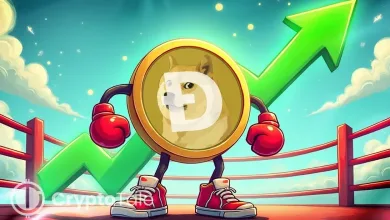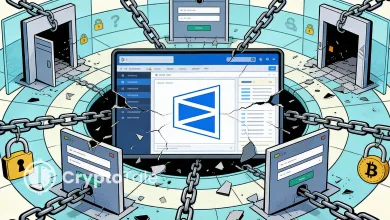Turkish Authorities Block 46 Sites, Including PancakeSwap And Cryptoradar

- Turkey has blocked PancakeSwap and 45 other crypto sites for not following license rules.
- The new Turkish law forces platforms to check users for transactions over $425.
- Countries like Russia and Venezuela have taken similar steps to stop unlicensed sites.
Turkey’s Capital Markets Board (CMB) has ordered internet providers to block access to 46 cryptocurrency websites, including PancakeSwap and Cryptoradar, for operating without a local license. The sweeping move, reported on July 4, follows updated regulatory frameworks requiring crypto platforms to comply with Know Your Customer (KYC) and Anti-Money Laundering (AML) laws. Notably, PancakeSwap processed over $325 billion in trading volume in June, placing it among the top decentralized exchanges alongside Uniswap and Curve.
CMB cited the Capital Markets Law No. 6362, specifically Articles 99/3 and 128/1(a), as the basis for the legal actions. Although PancakeSwap is decentralized and lacks a formal legal entity in Turkey, the regulator included it in the block order. Cryptoradar, a price comparison site, was also affected, although it does not facilitate transactions directly.
The Turkish government has not detailed the process it used to identify unauthorized activity. PancakeSwap has not responded to multiple requests for comment regarding the matter.
Regulatory Push Aligns with Turkey’s Crypto Licensing Laws
This enforcement comes months after Turkey strengthened crypto oversight through new laws published in the Official Gazette on December 25, 2024. These rules require service providers to identify users in transactions exceeding 15,000 Turkish lira, approximately $425. According to the CMB, this step aims to reduce money laundering, terrorist financing, and illicit fund transfers via digital assets.
Effective from February 25, 2025, it was made that the crypto providers must also verify the identity of users sending funds from previously unregistered wallets. While transactions below the 15,000 lira threshold remain exempt from KYC checks, the regulation signals a growing focus on AML enforcement.
In March, the CMB also changed the oversight regulations, imposing disclosures of transactions on a monthly basis, complete visibility of customer accounts, and other reporting requirements on all crypto platforms. Those policies emerged to adjust the nation according to international compliance norms and provide stable access to information finance systems.
CMB in Turkey has not published a set of measures on the basis of which it reserves the choice of platforms such as PancakeSwap in the non-compliant category. This has fuelled concerns about enforcement transparency.
Global Trend Toward Decentralized Exchange Restrictions
According to Finance Feeds, Turkey’s regulatory actions are part of a larger global trend in which countries seek to control DeFi access and enforce local financial rules. Governments in Kazakhstan, Venezuela, the Philippines, and Russia have implemented similar crackdowns on unauthorized crypto platforms. These efforts often cite unregistered services, a lack of consumer protection, and illicit use cases.
Backed by fancy protocols on blockchain networks, decentralized exchanges are neither competitive nor centralized. Hence, it becomes almost impossible to enforce any regulations locally. This organizational setup usually conflicts with national licensing regimes that require legal accountability, tax reporting, and identity verification.
For users in Turkey, the block of access to PancakeSwap and other similar platforms reduces access to decentralized financial tools. A shift of users toward centralized platforms can be anticipated as an approach towards a stable environment.
Related: SEC Drops Gensler-Era DeFi Exchange, Custody Proposals
Is DeFi’s Borderless Promise Facing Fragmentation?
Drawn from the recent Turkish action, it ought to be made emphatically clear. DeFi can no longer be seen by national regulators as just an experimental arm of the cryptos, but instead, must be legally regulated as a financial conduit. With more countries working on local licensing regimes, it is only a matter of time before the global expansion of DeFi is tied to its capacity for adaptive compliance on a country-by-country basis.




